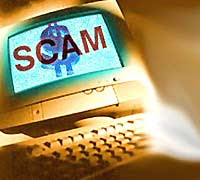
Unfortunately, scams targeting the elderly are
nothing new, but notice the twist on this NY Times article...
"InfoUSA, one of the nation’s largest list brokers and a publicly held company, matches buyers and sellers of data...helped sell lists to companies that were under investigation or had been prosecuted for fraud."
Ok, so what? A mailing list company sells to crooks. Read on.
Scammers will call targets posing as insurance agents, medical personnel, etc. needing to "update" information. It's a phishing phone call. But they need a way to use information they obtain, like bank routing numbers.
"Criminals can use such banking data to create unsigned checks that withdraw funds from victims’ accounts. Such checks, once widely used by gyms and other businesses that collect monthly fees, are allowed under a provision of the banking code. The difficult part is finding a bank willing to accept them."
They found at least one: Wachovia Bank.
"Wachovia accepted $142 million of unsigned checks from companies that made unauthorized withdrawals from thousands of accounts, federal prosecutors say. Wachovia collected millions of dollars in fees from those companies, even as it failed to act on warnings, according to records."
"Banking rules required Wachovia to periodically screen companies submitting unsigned checks. Yet there is little evidence Wachovia screened most of the firms that profited from the withdrawals."
Wachovia wasn't the only bank to do this, just the largest one.
You know, I have come to think it is just too dangerous to give information to
anyone who calls you and asks for it. There is no way to tell if the person on the phone is legitimate or a scammer. It has become my personal policy to not do business with any company that telemarkets to me. When companies call me, I let them know they have lost any chance of obtaining me as a customer due to their use of telemarketing.
If you don't already do business with the company calling, hang up.












